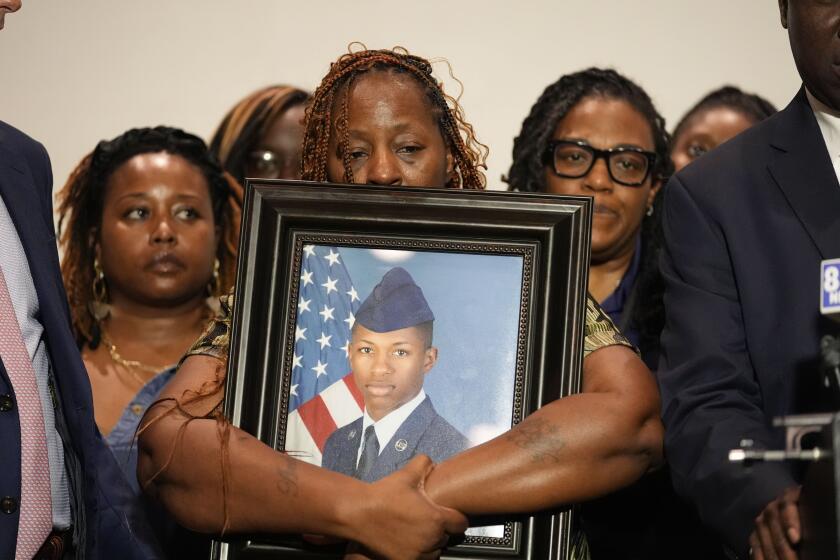Crime Bill Nears House Floor Vote : Congress: Negotiators in marathon session report they are near agreement on stalled measure. Tired lawmakers convene to await final wording.
A marathon effort to rescue President Clinton’s endangered anti-crime bill appeared to gather momentum Saturday evening as Republican and Democratic negotiators reported that they were near agreement after haggling for the better part of two days over proposed funding cuts.
The hopeful assessment that a deal could be struck in time to send a final anti-crime bill to the full House for a late-night floor vote came after the negotiations had appeared to stall over concessions demanded by Republicans and moderate Democrats.
Earlier in the day, Republicans rejected yet another set of proposed Democratic concessions as inadequate and differences emerged between the Democrats themselves over an assault weapon ban that Clinton has declared must stay in the bill, pared back to a cost of about $30 billion.
The House, its members increasingly short-tempered as Democrats and Republicans accused one another of acting in bad faith, convened at noon Saturday and was standing by well into the evening waiting for the closed-door negotiations to produce a final agreement.
Many members, eager to begin a summer recess that has been delayed by legislative impasses over the anti-crime bill and health care reform, were clearly willing to vote on almost any bill that could make its way to the House floor by today.
President Clinton, in his weekly radio address to the nation, appealed for swift action to pass what he characterized as “the toughest” anti-crime legislation ever taken up by Congress. The Administration’s initiative contains funds for prison construction, new police hires and a variety of crime prevention programs. It also would ban the sale of 19 categories of semiautomatic assault weapons.
“We must not let this chance pass by,” Clinton said, appealing for bipartisan support to overcome strong opposition from many Republicans and a significant number of Democrats. “We must seize the opportunity before us to make a dramatic difference in every neighborhood.”
While significant progress was made when Democrats agreed to further cuts in crime prevention programs criticized by Republicans as “pork,” House leaders said after emerging from an all-night negotiating session early Saturday that the two sides still had some differences. The sticking points included provisions relating to rape prosecutions and early release of nonviolent drug offenders to make room in crowded prisons for violent criminals.
The negotiations resumed late in the morning and dragged on into the day, stretching tempers to the breaking point and sparking disagreements on other points. The new disputes included GOP demands for procedures to expedite the deportation of criminal immigrants and a “truth in sentencing” proposal that would deny prison funding to states that fail to make repeat violent offenders serve at least 85% of their jail sentence.
Another potential snag emerged when some Democrats opposed to the assault weapon ban pressed for changes that would delay its implementation.
“We solve one thing and another thing comes up,” complained an exasperated Rep. Patricia Schroeder (D-Colo.) “It’s like nailing Jell-O to the wall.”
As the day wore on, the negotiators continued to predict that a compromise eventually would be reached--not so much because of Clinton’s appeal for bipartisan cooperation but because of legislative fatigue.
“People just want to get out of here. It’s exhaustion at this point,” said Rep. Philip R. Sharp (D-Ind.), one of many lawmakers who were waiting in the wings for the negotiators to bring the revised anti-crime bill back to the House floor.
“I’m at the point where I’ll vote for almost anything to end this and go home,” another lawmaker said.
Exhaustion--and the knowledge that control of the House and Senate next year could turn on the fate of the anti-crime bill--appeared to be the motivating force behind a key concession made by Democrats to a group of Republicans led by Rep. Michael N. Castle, former governor of Delaware.
Over the last few days, the White House has made successively larger offers to cut the bill’s $30-billion price tag in an effort to attract the votes of about 40 moderate Republicans in the Castle-led group.
Under the formula the two sides finally agreed on, about $3.3 billion would be cut from the bill, with $2.5 billion of that coming from crime prevention programs and $800 million from funds for new prison construction and more police.
The $2.5-billion cut, which would reduce funding for the crime prevention side of the package to about $5 billion, would be accomplished by jettisoning a youth job training initiative and cutting remaining “social” programs in the bill by about 10%.
Overall, the ratio of money spent on the crime prevention provisions favored by liberals would drop to $1 for every $6 spent on the law enforcement programs favored by conservatives in the scaled-back bill.
The new ratio did not sit well with liberal lawmakers, especially the 37 members of the Congressional Black Caucus. But the spending concessions appeared to be the only way the bill could muster enough Republican support to get around a roadblock erected by some 50 Democrats who opposed the assault weapon ban--the provision for which Clinton has fought the hardest and invested the most presidential prestige.
The Democratic gun control opponents seethed over Clinton’s sharp criticism of their tactics. One of them, Rep. Bill Brewster (D-Okla.), said he sent the White House an angry letter defending gun ownership and denying the President’s portrayal of the group as lawmakers who had “run from their responsibilities . . . and taken the easy way out.”
In a sign that the fight over the bill’s gun control provisions was not over, a Democratic source said that House Judiciary Committee Chairman Jack Brooks (D-Tex.) was seeking legislative changes that would delay implementation of the assault weapon ban.
Even if the ban is modified slightly, the source said, it would not be dropped from the bill unless the effort to reach an agreement with moderate Republicans fails and “we have to come back here next week and do the whole thing over again with a different approach.”
More to Read
Start your day right
Sign up for Essential California for news, features and recommendations from the L.A. Times and beyond in your inbox six days a week.
You may occasionally receive promotional content from the Los Angeles Times.






